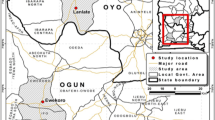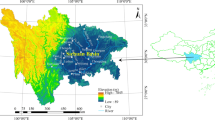Abstract
THE late Dr. C. F. Marbut proposed the division of the soils of the world into two primary groups, namely, pedocals and pedalfers. Pedocals are soils developed under climates which are too dry to maintain a continuous downward movement of water to the water table. They therefore contain a horizon of accumulation of calcium carbonate (and sometimes other salts also) in the soil profile, usually in the B horizon. Pedalfers are soils developed under more humid climates. They are completely leached and contain no horizon of calcium carbonate accumulation. Thus the steppe and desert soils of the semiarid and arid regions are distinguished from thepodsolic and lateritic soils of the humid temperate and humid tropical climates. It has been generally accepted that the climate of Great Britain is too wet for pedocals to develop. Under free drainage conditions, therefore, horizons of secondary calcium carbonate accumulation should not occur.
This is a preview of subscription content, access via your institution
Access options
Subscribe to this journal
Receive 51 print issues and online access
$199.00 per year
only $3.90 per issue
Buy this article
- Purchase on Springer Link
- Instant access to full article PDF
Prices may be subject to local taxes which are calculated during checkout
Similar content being viewed by others
Author information
Authors and Affiliations
Rights and permissions
About this article
Cite this article
KAY, F. Pedocalic Tendencies in Soils of Southern England. Nature 141, 925–926 (1938). https://doi.org/10.1038/141925b0
Issue Date:
DOI: https://doi.org/10.1038/141925b0
Comments
By submitting a comment you agree to abide by our Terms and Community Guidelines. If you find something abusive or that does not comply with our terms or guidelines please flag it as inappropriate.



